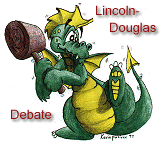
Appearance
Regardless of whether it is right or wrong, many judges form strong opinions about a debater by his appearance. Judges have been heard to say, "Look how professional she looks. I knew she would win the moment she walked into the room." With such strong opinions present, a debater who has a desire to win should play the part. There is room for flexibility and individual taste; however, a debater must be aware of the impact appearance has in determining the outcome of a round.
Delivery
Although analysis, logic, and evidence are important in a debate round, debaters should never forget that debate is a form of communication. Effective communi-cations skills should be practiced and utilized during a debate round. Frequently, debaters need work in the following areas:
- Eye Contact: Debaters should memorize their affirmative construction and practice reading evidence cards. Questions like, "How can I read and look at the judge at the same time?" must be overcome. Awareness, practice, and experience will lead to extraordinary capabilities - a speaker must first realize that a debater can have substantial content and a quality presentation simultaneously.
- Introductions and Conclusions: Countless debaters have received a critique sheet with the comment, "The affirmative was more persuasive," written in the Reason for Decision block. Brief introductions and conclusions do not subtract from the content of a speech but add to its substance. Introductions prepare the judge allowing him to adjust and focus on the change in position. Conclusions point out the important issues and help maintain the debate flowing in one direction.
- Signposting: Using internal transitions (first, second, etc.) help separate arguments and issues allowing the judge to more easily flow the round. Without signposting, issues tend to run together and the judge may have difficulty determining when an explanation ends and a new argument begins. In such cases, some arguments may not make their way onto a judge's flow sheet and, therefore, may not contribute to winning the round.
- Tone: Rounds can become heated, complex, and frustrating. However, a debater should always maintain a cool, calm demeanor and deliver each word with authoritative confidence. A debater who shouts, uses sarcasm, looses his "cool," or appears uncertain will unlikely be able to persuade a judge that his position should be accepted.
Rapid Fire
As a judge it is easy to either oppose or endorse the practice of rapid fire. Personally, I allow a speaker to speak as fast as he wants as long as I can understand him and can flow his arguments. However, as a coach, I must caution debaters that some judges despise rapid fire while others revel in it.
- Definition: Rapid fire is an unnaturally rapid delivery rate of a speech. A few judges consider any rate faster than that used in normal conversation to be rapid fire.
- Purpose: Debaters use rapid fire (1) to impress the judge with his advanced skills, (2) to overload an opponent's ability to deal with the issues, or (3) to attempt to adequately respond to a number of complex arguments.
- Abusive: Rapid fire can always be judged as abusive and unacceptable at any point where the speech becomes unintelligible or interferes with the judge's ability to flow the issues. In many cases, arguments presented in this manner are ignored by the judge.
- Feedback: A debater who chooses to employ rapid fire must be sensitive to a judge's reaction. If a judge shakes his head back and forth, places his pen on the desk, and leans back in his chair, the speaker may be in trouble and should probably slow down. If a judge makes a comment concerning delivery rate, either good or bad, a wise debater will not ignore the comment. A debater who seriously considers the comment, attempts to remember the judge's feedback during the round, and adjusts his delivery accordingly will be better able to adjust to a variety of judge's in the future. Some debaters ask a judge for his preference before the round, but some judges are not always truthful?
- Balance: My advice, as a coach, is to balance the need to get in additional information and the possible negative effects - namely loss of speaker points and/or loss of the round. Never rapid fire to impress a judge or to overload an opponent. If a debater must get in an argument or drop the round, it's better to sacrifice the speaker points. Overall, the best way to avoid the need to rapid fire is to be prepared, well organized, be concise in delivery, and group arguments.
Ethical Considerations
Simple, be firm and persistent but play by the rules, don't falsify evidence, be kind and considerate to others regardless of how they act. "What goes around, comes around - remember Richard Nixon." A debater has not won a round if he has done so unethically regardless of the ballot or the trophies on a shelf.